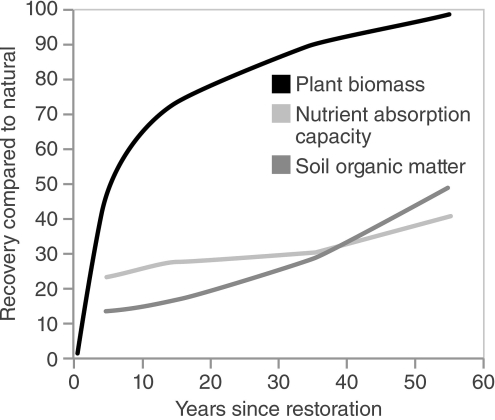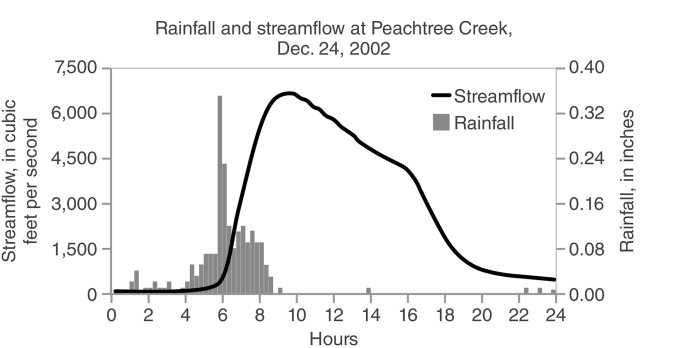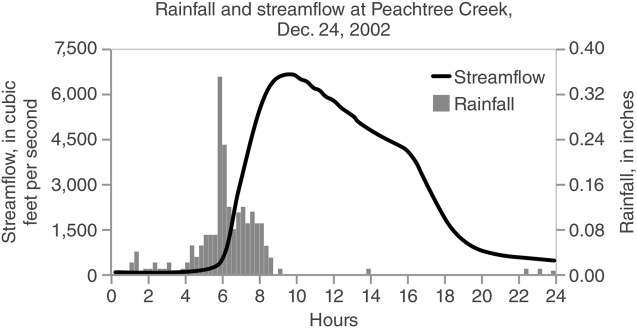Deck 10: Oceans
Question
Question
Question
Question
Question
Question
Question
Question
Question
Question
Question
Question
Question
Question
Question
Question
Question
Question
Question
Question
Question
Question
Question
Question
Question
Question
Question
Question
Question
Question
Question
Question
Question
Question

Unlock Deck
Sign up to unlock the cards in this deck!
Unlock Deck
Unlock Deck
1/34
Play
Full screen (f)
Deck 10: Oceans
1
Which of the following foods requires the most water to produce?
A) A cup of coffee
B) A glass of milk
C) A hamburger
D) A tomato
A) A cup of coffee
B) A glass of milk
C) A hamburger
D) A tomato
C
2
Which of the following is an example of a nonpoint source of pollution?
A) An industrial facility
B) Water released from a paint manufacturer
C) Fertilizer- enriched runoff
D) Municipal sewage treatment plant
A) An industrial facility
B) Water released from a paint manufacturer
C) Fertilizer- enriched runoff
D) Municipal sewage treatment plant
C
3
Which of the following natural processes would have to occur for water in the oceans to become fresh water available for human use?
A) Evaporation and infiltration
B) Evaporation and precipitation
C) Precipitation and infiltration
D) Transpiration, purification, and precipitation
A) Evaporation and infiltration
B) Evaporation and precipitation
C) Precipitation and infiltration
D) Transpiration, purification, and precipitation
B
4
In a freshwater lake, the zone is characterized by a shallow depth and the presence of rooted vegetation.
A) profundal
B) littoral
C) limnetic
D) thermocline
A) profundal
B) littoral
C) limnetic
D) thermocline

Unlock Deck
Unlock for access to all 34 flashcards in this deck.
Unlock Deck
k this deck
5
Which of the following would cause a rising water table?
A) Decreasing infiltration
B) Groundwater depletion exceeding the recharge rate
C) Increased precipitation
D) Increased runoff
A) Decreasing infiltration
B) Groundwater depletion exceeding the recharge rate
C) Increased precipitation
D) Increased runoff

Unlock Deck
Unlock for access to all 34 flashcards in this deck.
Unlock Deck
k this deck
6
Groundwater as a water source may be better than surface water because .
A) groundwater is a self- replenishing resource that cannot be exhausted
B) groundwater is more easily located than surface water
C) groundwater may be naturally purified by percolation through soil
D) surface water is not naturally self- replenishing
A) groundwater is a self- replenishing resource that cannot be exhausted
B) groundwater is more easily located than surface water
C) groundwater may be naturally purified by percolation through soil
D) surface water is not naturally self- replenishing

Unlock Deck
Unlock for access to all 34 flashcards in this deck.
Unlock Deck
k this deck
7
Depletion of groundwater supplies can cause which of the following?
A) Land subsidence
B) A rise in the water table
C) The overabundance of surface waters
D) The flooding of wetlands
A) Land subsidence
B) A rise in the water table
C) The overabundance of surface waters
D) The flooding of wetlands

Unlock Deck
Unlock for access to all 34 flashcards in this deck.
Unlock Deck
k this deck
8
All of the following processes involve the flux of water into the atmosphere except .
A) sublimation
B) transpiration
C) percolation
D) evaporation
A) sublimation
B) transpiration
C) percolation
D) evaporation

Unlock Deck
Unlock for access to all 34 flashcards in this deck.
Unlock Deck
k this deck
9
A specific example of nonconsumptive use of water is .
A) disposal of sewage wastewater
B) cattle- grazing operations on federal lands
C) commercial forestry
D) agriculture
A) disposal of sewage wastewater
B) cattle- grazing operations on federal lands
C) commercial forestry
D) agriculture

Unlock Deck
Unlock for access to all 34 flashcards in this deck.
Unlock Deck
k this deck
10
The city of Orangeville, Iowa, gets all of its water from groundwater aquifers. Each of the city's 6,000 residents uses an average of 200 gallons of water daily. If the city wishes to use its water sustainably, what would the total daily recharge rate of its aquifers have to be?
A) 200 gallons per day
B) 1.2 million gallons per day
C) 6,000 gallons per day
D) 120 thousand gallons per day
A) 200 gallons per day
B) 1.2 million gallons per day
C) 6,000 gallons per day
D) 120 thousand gallons per day

Unlock Deck
Unlock for access to all 34 flashcards in this deck.
Unlock Deck
k this deck
11

Which of the following conclusions can be drawn from this graph depicting recovery after wetland restoration?
A) Soil organic matter and nutrient absorption are much easier to accomplish than improvements in biomass.
B) Soils are more important to wetland restoration than are plants.
C) It takes 10 to 20 years after wetland restoration for a wetland to be fully functional.
D) Plant biomass recovers relatively rapidly in restored wetlands.

Unlock Deck
Unlock for access to all 34 flashcards in this deck.
Unlock Deck
k this deck
12
Where will you find a riparian zone?
A) In an area that has been heavily eroded because of the removal of vegetation
B) In an aquifer
C) Along a waterway
D) Between topsoil and the water table
A) In an area that has been heavily eroded because of the removal of vegetation
B) In an aquifer
C) Along a waterway
D) Between topsoil and the water table

Unlock Deck
Unlock for access to all 34 flashcards in this deck.
Unlock Deck
k this deck
13

The graph depicts rainfall and stream discharge during a flood event along Peachtree Creek on December 24, 2002. Which of the following can be inferred from the graph?
A) Creek levels subsided as quickly as they rose.
B) Water levels in the creek returned to base levels by the end of the day.
C) Most of the rain fell during the time period from 8 A.M. to 5 P.M. (17:00).
D) Creek water levels peaked 3 hours after the rain fell hardest.

Unlock Deck
Unlock for access to all 34 flashcards in this deck.
Unlock Deck
k this deck
14

Artificial wetlands .
A) can help purify water and also provide wildlife habitat
B) purify water for use as bottled drinking water
C) are the major program for replacing lost natural wetlands
D) are a source of arsenic contamination in Bangladesh

Unlock Deck
Unlock for access to all 34 flashcards in this deck.
Unlock Deck
k this deck
15

A watershed is .
A) a term used to describe water stored underground
B) an inland basin that connects to another inland basin
C) a river that drains into the sea
D) the area of land from which rainfall drains into rivers or lakes

Unlock Deck
Unlock for access to all 34 flashcards in this deck.
Unlock Deck
k this deck
16
All of the following are predicted to occur in the near future except:
A) More battles over water rights will arise between urban centers and agriculture.
B) Large urban areas around the globe will grow quickly without the infrastructure needed for providing safe drinking water.
C) Water conservation measures will allow the Ogallala Aquifer to become replenished.
D) Lake Mead may dry up.
A) More battles over water rights will arise between urban centers and agriculture.
B) Large urban areas around the globe will grow quickly without the infrastructure needed for providing safe drinking water.
C) Water conservation measures will allow the Ogallala Aquifer to become replenished.
D) Lake Mead may dry up.

Unlock Deck
Unlock for access to all 34 flashcards in this deck.
Unlock Deck
k this deck
17
Most of the water on Earth is found .
A) underground
B) in polar ice caps
C) in oceans
D) in lakes and rivers
A) underground
B) in polar ice caps
C) in oceans
D) in lakes and rivers

Unlock Deck
Unlock for access to all 34 flashcards in this deck.
Unlock Deck
k this deck
18
The city of Orangeville, Iowa, gets all of its water from groundwater aquifers. Each of the city's 6,000 residents uses an average of 200 gallons of water daily. If the city's citizens wish to use water more sustainably, which one of the following would you recommend that its citizens do?
A) Stop using water for drinking and cooking
B) Stop flushing their toilets
C) Stop watering their lawns
D) Shut down all industry within the city
A) Stop using water for drinking and cooking
B) Stop flushing their toilets
C) Stop watering their lawns
D) Shut down all industry within the city

Unlock Deck
Unlock for access to all 34 flashcards in this deck.
Unlock Deck
k this deck
19
All of the following are reasons why freshwater resources are so scarce except for the following:
A) Most of the planet's water is too salty to be used efficiently.
B) The majority of our freshwater resources is frozen and located far from human habitation.
C) Global warming has dried up most of our global freshwater resources.
D) Many of our freshwater resources are too polluted to be used safely by humans.
A) Most of the planet's water is too salty to be used efficiently.
B) The majority of our freshwater resources is frozen and located far from human habitation.
C) Global warming has dried up most of our global freshwater resources.
D) Many of our freshwater resources are too polluted to be used safely by humans.

Unlock Deck
Unlock for access to all 34 flashcards in this deck.
Unlock Deck
k this deck
20

The city of Orangeville, Iowa, gets all of its water from groundwater aquifers. If the residents of Orangeville cannot use its groundwater resources sustainably, all of the following potential consequences could occur except:
A) Nearby rural wells may begin to dry up.
B) The water table may lower, and surface waters may begin to dry up.
C) Pollutants in the groundwater aquifers may become more concentrated.
D) The land in the area may start to sink.

Unlock Deck
Unlock for access to all 34 flashcards in this deck.
Unlock Deck
k this deck
21
All of the following are potential consequences of inadequate treatment of drinking water except .
A) contamination of groundwater resources with harmful bacteria
B) dehydration caused by drinking contaminated water
C) drinking water that contains feces
D) contraction of gastrointestinal disease
A) contamination of groundwater resources with harmful bacteria
B) dehydration caused by drinking contaminated water
C) drinking water that contains feces
D) contraction of gastrointestinal disease

Unlock Deck
Unlock for access to all 34 flashcards in this deck.
Unlock Deck
k this deck
22
A septic system is .
A) a second- level mechanism to remove bacteria at a wastewater treatment plant
B) a rural method of handling sewage
C) an early version of a wastewater treatment plant
D) a toxic or badly polluted waterway
A) a second- level mechanism to remove bacteria at a wastewater treatment plant
B) a rural method of handling sewage
C) an early version of a wastewater treatment plant
D) a toxic or badly polluted waterway

Unlock Deck
Unlock for access to all 34 flashcards in this deck.
Unlock Deck
k this deck
23
Define water pollution, point source, and nonpoint- source pollution. Explain which of the two (point source or nonpoint source) is more difficult to regulate and currently poses the greater threat to freshwater resources?

Unlock Deck
Unlock for access to all 34 flashcards in this deck.
Unlock Deck
k this deck
24
Identify and describe the major fluxes of the hydrologic cycle.

Unlock Deck
Unlock for access to all 34 flashcards in this deck.
Unlock Deck
k this deck
25
The fish in the lake at the local park are dying, so a professor from the local college comes to investigate. First, she measures the dissolved oxygen because she wants to check for the .
A) possibility of eutrophication
B) presence of bacteria
C) influence of acid precipitation
D) presence of heavy metals
A) possibility of eutrophication
B) presence of bacteria
C) influence of acid precipitation
D) presence of heavy metals

Unlock Deck
Unlock for access to all 34 flashcards in this deck.
Unlock Deck
k this deck
26
Which of the following pairs of processes are most similar?
A) Evaporation and percolation
B) Percolation and infiltration
C) Precipitation and infiltration
D) Transpiration and precipitation
A) Evaporation and percolation
B) Percolation and infiltration
C) Precipitation and infiltration
D) Transpiration and precipitation

Unlock Deck
Unlock for access to all 34 flashcards in this deck.
Unlock Deck
k this deck
27
Which of the following human activities has been most problematic for wetlands around the world?
A) The alteration of ocean current circulation resulting in erosion of wetlands
B) Eutrophication caused by humans dumping pollutants into water
C) The draining and alteration of wetlands for agriculture and urban development
D) Boat traffic that causes excess oil and gas to be dumped in waterways
A) The alteration of ocean current circulation resulting in erosion of wetlands
B) Eutrophication caused by humans dumping pollutants into water
C) The draining and alteration of wetlands for agriculture and urban development
D) Boat traffic that causes excess oil and gas to be dumped in waterways

Unlock Deck
Unlock for access to all 34 flashcards in this deck.
Unlock Deck
k this deck
28
Describe how excessive algae growth can occur in a freshwater ecosystem, and explain why it is a problem.

Unlock Deck
Unlock for access to all 34 flashcards in this deck.
Unlock Deck
k this deck
29

The graph depicting stream discharge during the flood event along Peachtree Creek is called a .
A) hydrograph
B) aquagraph
C) precipitation graph
D) flow chart

Unlock Deck
Unlock for access to all 34 flashcards in this deck.
Unlock Deck
k this deck
30
Which of the following would cause a rising water table?
A) Decreasing infiltration
B) Increased runoff
C) Increased precipitation
D) Groundwater depletion exceeding the recharge rate
A) Decreasing infiltration
B) Increased runoff
C) Increased precipitation
D) Groundwater depletion exceeding the recharge rate

Unlock Deck
Unlock for access to all 34 flashcards in this deck.
Unlock Deck
k this deck
31

Humans use more fresh water for _ than for any other purpose.
A) drinking and cooking
B) agriculture
C) washing and home use
D) mining and industrial processes

Unlock Deck
Unlock for access to all 34 flashcards in this deck.
Unlock Deck
k this deck
32
Your friend is an avid gardener. She is concerned about the overuse of freshwater resources and asks for your advice on how to conserve water while still being able to enjoy her hobby. Describe two water- conservation practices that your friend can incorporate into her gardening activities.

Unlock Deck
Unlock for access to all 34 flashcards in this deck.
Unlock Deck
k this deck
33

The people of the central Great Plains depend on the _ aquifer for drinking water and agricultural needs.
A) Nebraska
B) Omaha
C) Ogallala
D) Trans Dakota- Texas

Unlock Deck
Unlock for access to all 34 flashcards in this deck.
Unlock Deck
k this deck
34
Desalination plants, such as the one completed in Tampa Bay in 2008, _.
A) produce enough water for local agricultural crops such as corn
B) are needed to convert seawater into drinking water
C) produce water as inexpensively as groundwater supplies
D) are expensive and not a sustainable source of water, given today's technologies
A) produce enough water for local agricultural crops such as corn
B) are needed to convert seawater into drinking water
C) produce water as inexpensively as groundwater supplies
D) are expensive and not a sustainable source of water, given today's technologies

Unlock Deck
Unlock for access to all 34 flashcards in this deck.
Unlock Deck
k this deck


